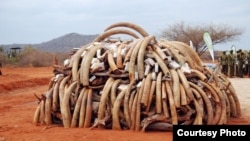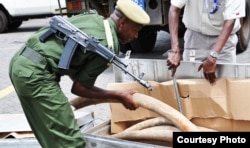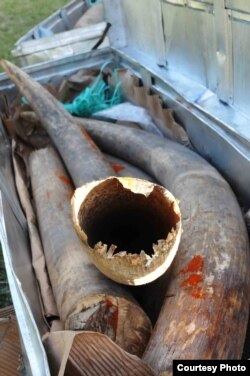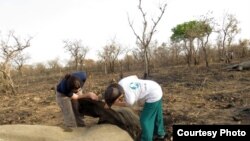The worldwide poaching of elephants has been growing rapidly. More than 20,000 were killed in 2011, for an estimated 24,000 kilograms of ivory — a fraction, say authorities, of the amount actually sold. Officials with the International Criminal Police Organization, Interpol, say the high market value of ivory — over $900 per kilogram in China — has attracted new sponsors: organized crime.
But as poaching increases, so do efforts to meet the challenge.
One of the most prominent is Project Wisdom, a multi-year effort by Interpol’s Environmental Crime Program to fight trafficking in African elephant ivory and rhinoceros horn. So far, it’s included five different initiatives, yielding record amounts of ivory and more arrests than ever before.
The most recent effort, called Operation Worthy, involved 14 African countries, including Ethiopia, Kenya, Liberia, Mozambique, Nigeria, Rwanda and Zimbabwe over a three-month period.
William Clark, the lead officer and coordinator of the project, said it includes multiple government agencies from each participating country, including the judiciary, customs, police, wildlife and even revenue services.
"We ended up with 214 arrests, about two tons of elephant ivory seized; [and] a big variety of other wildlife contraband," he said. "We’ve from time to time in our operations picked up some drugs, some illegal gold and even some smuggled cigarettes."
He said other contraband proves the poachers are becoming more sophisticated: 30 military firearms, including AK47’s, G3’s and even M16’s, which Clark says are not legitimately sold to anyone outside the military.
"We are just starting to see them in the past year or so come in such increasing numbers [that] they’re starting to alarm people," he said. "[The M16] is a weapon that’s more accurate than the old Kalashnikov [rifle and submachine gun], with a greater range [and] more fire power. Even the wound made by an M16 bullet is much more tearing than the Kalashnikov, so it’s a more deadly, harmful weapon."
Clark said organized crime is hiring gangs of up to 18 people, many of whom wear fatigues and adopt military-style techniques, such as security patrols to guard their camps.
Instead of engaging the criminals in a race for more sophisticated weapons, he said, Interpol and its partners areuse policing methods based on human rights, including the right to be charged before a magistrate and the right to remain silent.
"Military armies go out intent on battle and killing enemy soldiers," he said. "A police officer goes out under the legal requirement to use the least force necessary to have the law enforced."
Interpol offers technical investigative assistance and training, and provides national police agencies with improved technologies, including night-vision equipment.
Poachers, he said, often surrender without a fight once they realize they’re surrounded, as many gangs march long distances to their destinations, giving authorities plenty of time to catch them.
"For example," said Clark, "some poachers come out of Somalia to poach elephants in Kenya, and they’ve got to walk a couple of hundred miles on foot. If there is pressure, [as from] a Kenya Wildlife Service unit [which can be refreshed from time to time with new people by helicopter], then you run [the poachers] until they’re really puffing. Then they won’t have as much fight as when they were starting the ordeal."
Interpol also helps customs agents recognize standard techniques that some criminals use to transport contraband, such as packing false walls of 20-foot steel shipping crates with timber, sisal or other products, or burying ivory in wet tea leaves to discolor it, since international law allows the sale of ivory purchased before1989, which marked the signing of the convention protecting endangered wildlife.
Other smuggling techniques include wrapping contraband in aluminum foil to avoid X-rays or packing it in pepper to trick dogs trained to identify ivory by smell. One gang, he said, actually baked the ivory in clay pieces that were shaped like artifact.
Increased collaboration
Once the poachers are apprehended, said Clark, Interpol works closely with judiciaries in partner countries to ensure stiff sentences are applied. Often, he said, Interpol helps to shape prosecution so that it can be expanded to include multi-count indictments.
"[For example], if this fellow was dealing in ivory, that’s an offense," explained Clark. "But he must [also] have cooked his books and held dual records and financial infractions: there must [also] be some unreported income, and if it’s unreported there must be some tax evasion. Maybe there’s some money laundering as well as common crimes such as fraud [and] conspiracy. Maybe [there are] other violations — veterinary, sanitary and a host of other laws we can enforce in countries where we have to make enough of case that justice will be served."
Interpol is planning to expand its African partnerships to included French-speaking countries and continue to work with China and other Asian countries to curtail demand for ivory products.
Interpol officials say by tackling wildlife trafficking in source countries, during shipping and in global markets, authorities can help prevent the extinction of the world’s remaining wild elephants.
But as poaching increases, so do efforts to meet the challenge.
One of the most prominent is Project Wisdom, a multi-year effort by Interpol’s Environmental Crime Program to fight trafficking in African elephant ivory and rhinoceros horn. So far, it’s included five different initiatives, yielding record amounts of ivory and more arrests than ever before.
The most recent effort, called Operation Worthy, involved 14 African countries, including Ethiopia, Kenya, Liberia, Mozambique, Nigeria, Rwanda and Zimbabwe over a three-month period.
William Clark, the lead officer and coordinator of the project, said it includes multiple government agencies from each participating country, including the judiciary, customs, police, wildlife and even revenue services.
"We ended up with 214 arrests, about two tons of elephant ivory seized; [and] a big variety of other wildlife contraband," he said. "We’ve from time to time in our operations picked up some drugs, some illegal gold and even some smuggled cigarettes."
He said other contraband proves the poachers are becoming more sophisticated: 30 military firearms, including AK47’s, G3’s and even M16’s, which Clark says are not legitimately sold to anyone outside the military.
"We are just starting to see them in the past year or so come in such increasing numbers [that] they’re starting to alarm people," he said. "[The M16] is a weapon that’s more accurate than the old Kalashnikov [rifle and submachine gun], with a greater range [and] more fire power. Even the wound made by an M16 bullet is much more tearing than the Kalashnikov, so it’s a more deadly, harmful weapon."
Clark said organized crime is hiring gangs of up to 18 people, many of whom wear fatigues and adopt military-style techniques, such as security patrols to guard their camps.
Instead of engaging the criminals in a race for more sophisticated weapons, he said, Interpol and its partners areuse policing methods based on human rights, including the right to be charged before a magistrate and the right to remain silent.
"Military armies go out intent on battle and killing enemy soldiers," he said. "A police officer goes out under the legal requirement to use the least force necessary to have the law enforced."
Interpol offers technical investigative assistance and training, and provides national police agencies with improved technologies, including night-vision equipment.
Poachers, he said, often surrender without a fight once they realize they’re surrounded, as many gangs march long distances to their destinations, giving authorities plenty of time to catch them.
"For example," said Clark, "some poachers come out of Somalia to poach elephants in Kenya, and they’ve got to walk a couple of hundred miles on foot. If there is pressure, [as from] a Kenya Wildlife Service unit [which can be refreshed from time to time with new people by helicopter], then you run [the poachers] until they’re really puffing. Then they won’t have as much fight as when they were starting the ordeal."
Interpol also helps customs agents recognize standard techniques that some criminals use to transport contraband, such as packing false walls of 20-foot steel shipping crates with timber, sisal or other products, or burying ivory in wet tea leaves to discolor it, since international law allows the sale of ivory purchased before1989, which marked the signing of the convention protecting endangered wildlife.
Other smuggling techniques include wrapping contraband in aluminum foil to avoid X-rays or packing it in pepper to trick dogs trained to identify ivory by smell. One gang, he said, actually baked the ivory in clay pieces that were shaped like artifact.
Increased collaboration
Once the poachers are apprehended, said Clark, Interpol works closely with judiciaries in partner countries to ensure stiff sentences are applied. Often, he said, Interpol helps to shape prosecution so that it can be expanded to include multi-count indictments.
"[For example], if this fellow was dealing in ivory, that’s an offense," explained Clark. "But he must [also] have cooked his books and held dual records and financial infractions: there must [also] be some unreported income, and if it’s unreported there must be some tax evasion. Maybe there’s some money laundering as well as common crimes such as fraud [and] conspiracy. Maybe [there are] other violations — veterinary, sanitary and a host of other laws we can enforce in countries where we have to make enough of case that justice will be served."
Interpol is planning to expand its African partnerships to included French-speaking countries and continue to work with China and other Asian countries to curtail demand for ivory products.
Interpol officials say by tackling wildlife trafficking in source countries, during shipping and in global markets, authorities can help prevent the extinction of the world’s remaining wild elephants.








